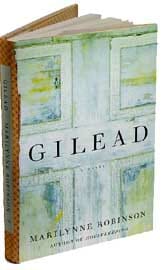Gilead

For Ruth, the adolescent narrator in Marilynne Robinson’s first novel, Housekeeping (1980), water figures as a destructive force, a drowner of towns and persons, but also as a source of possible resurrection. The book itself—now an acknowledged classic—has had a similarly multivalenced effect on a generation of readers struck by its spare, shimmering depths. Robinson’s subsequent books were equally surprising in their own way. After Housekeeping came a series of reports on nuclear pollution in England, published in 1989 as Mother Country, an eloquent, polemical elucidation of the connection between British social thought, the welfare state and pollution of the Irish Sea. More nonfiction followed, culminating in the astounding Death of Adam (1998), an unexpected but convincing declaration of love for John Calvin.
-

-

-

-

-

-

-

-

-

-

-

-

-

-

-

-

-

-

-

-

-

-

-

-

-

-

-

-

-

-

-

-

-

-

-

-

-

-

-

-








































